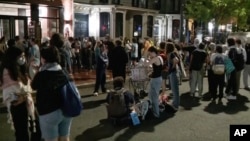Police in Washington cleared a pro-Palestinian protest encampment at George Washington University early Wednesday, arresting 33 people, authorities said.
Arrests were made on charges of assault on a police officer and unlawful entry, the District of Columbia's Metropolitan Police Department said.
A congressional committee canceled a hearing on the university encampment Wednesday. D.C. Mayor Muriel Bowser and Washington Police Chief Pamela Smith had been scheduled to testify about the city’s handling of the protest before the House Committee on Oversight and Accountability.
University parents and faculty members gathered Wednesday afternoon for a press conference to condemn the handling of the protests by police and school leaders.
“The university clearly does not value the students at all and has endangered the safety of our children by unleashing officers dressed in full riot gear to assault and spray our children in their eyes with pepper spray,” said Hala Amer, whose son participated in the campus protests.
Police said they dispersed demonstrators because "there has been a gradual escalation in the volatility of the protest."
American University professor Barbara Wien said she stayed in the encampment with GW students. She described the student protesters as democratic and peaceful.
Police started to shut down the tent encampment after dozens of protesters marched to GW President Ellen Granberg's on-campus home on Tuesday night. Police were called, but no arrests were made.
Speakers at the conference called for Granberg’s resignation because, they alleged, she refused to meet and negotiate with student protesters.
“You keep inciting violence and ignoring the students,” Amer said about Granberg in an interview with VOA after the conference. “It will just lead to more violence. You need to talk to your students.”
GW officials warned students that they could be suspended for engaging in protests at the school’s University Yard, an outdoor spot on the campus.
"While the university is committed to protecting students' rights to free expression, the encampment had evolved into an unlawful activity, with participants in direct violation of multiple university policies and city regulations," a GW statement said.
More than 2,600 people have been arrested at universities across the country in pro-Palestinian protests, according to The Associated Press.
Students are calling on their university administrations to divest investments from Israel or companies with ties to Israel. Demonstrators have gathered in at least 50 campuses since April 17, carrying signs that read "Free Palestine" and "Hands off Rafah."
Rafah is Gaza’s southernmost city, where most of the territory’s population has clustered. The area is also a corridor for bringing humanitarian aid into the Palestinian territory.
Israel seized the Gaza side of the Rafah crossing on Tuesday, while shutting off the nearby Kerem Shalom crossing, drawing criticism from humanitarian groups. Israel said Wednesday that it had reopened Kerem Shalom.
The nationwide campus protests started in response to Israel's offensive in Gaza that began after Hamas launched a terror attack on Israel on October 7, killing about 1,200 people and taking roughly 250 hostages.
More than 34,000 Palestinians have been killed in Israel's offensive, according to the Gaza Health Ministry. Israel warned it could "deepen" its operation in Rafah if talks failed to secure the release of the hostages.
Some information for this report came from The Associated Press.





